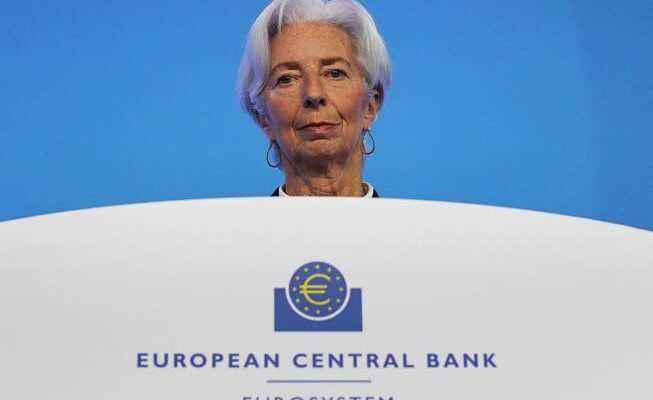In view of the massive inflation, the ECB can no longer avoid the interest rate turnaround. But the policy change comes too late and too weak. The reason for this is the concern about the high national debt. Citizens will initially have to live with high inflation.
ECB President Christine Lagarde: The French loves to take care of climate change and gender equality, but now high inflation and the monetary policy response to it should be the top priority.
Imagine the situation in the euro area as a 10,000 meter race between inflation and the European Central Bank (ECB): While inflation is now well past two kilometers, the ECB has finally decided to do it soon also to start running. However, she doesn’t want to decide until later whether she will start the pursuit quickly or rather leisurely.
But at least, in view of the high inflation rates, ECB President Christine Lagarde and the ECB Council want to end the bond purchases that have been ongoing since 2015 on July 1st and then carry out the first interest rate hike since 2011 at the next council meeting on July 21st. Further rate hikes will follow. By September at the latest, the negative interest rates, which are currently still at -0.5 percent, should finally be history after eight long years. However, the ECB is far too late with its policy change.
Inflation at record high
In the euro zone, inflation was 8.1 percent in May well above the ECB’s medium-term target of 2 percent. It is the highest level for around 40 years. Core inflation, excluding volatile energy and food prices, is also at a high 3.8 percent. So inflation is already widening, as consumers feel with almost every purchase. At the same time, the unemployment rate in the euro area is at its lowest level since the introduction of the euro, and the economy is holding up surprisingly well in view of the Ukraine war and drastic corona restrictions in China.
The consequences of the war, which the ECB overemphasizes out of self-protection, have forced the general price increase, but it has been going on for much longer. It has therefore been difficult to understand why the ECB has been buying billions in bonds and maintaining negative interest rates for months. A clever monetary policy would have acted more foresighted and gradually abandoned the ultra-expansive policy, because experience has shown that a central bank always has to reckon with exogenous shocks – this time it was the pandemic, the supply chain problems and the Ukraine war.
Threatening wage-price spiral
The ECB estimates the neutral interest rate level, at which monetary policy is neither expansive nor restrictive, to be around 1.25 to 1.5 percent, while other economists place it at more than 2 percent. The interest rates of the central bank are therefore still well below the neutral level. As long as this is the case, the monetary environment will continue to drive inflation – although the central bank should put the brakes on inflation.
The already uncomfortable situation is likely to worsen. Inflationary pressures appear to be increasing. For example, the price pressure on upstream levels is persistently high. Producer prices in the manufacturing sector in Germany have recently skyrocketed by 33 percent. These increases will also impact end-user prices.
At the same time, the previously moderate wage development is gaining momentum. While negotiated wages rose by 1.6 percent in the euro area at the end of 2021, they had already increased by 2.8 percent in the first quarter of this year. Anyone who also looks at the current wage demands of the trade unions will hardly doubt that the dreaded wage-price spiral is beginning to turn. Nevertheless, many people in Europe will suffer real wage losses in 2022.
Reversed roles in the EU
In the meantime, the finance ministers of many euro countries are worried about the consequences of high inflation for their citizens and are launching (often little useful) relief programs. So while the ECB, with its much too loose monetary policy, always has a few highly indebted countries like Italy in mind and is more or less taking care of financial policy with its bond purchases, the finance ministers, for their part, want to counteract inflation with concerted measures.
The Mannheim economist Klaus Adam recently commented on Twitter with the remark: “Everything is upside down in the EU – the ECB takes care of the solvency of states, and the finance ministers worry about inflation. Wasn’t the distribution of tasks in the EU treaties reversed?”
Everything upside down in the #EU: @ecb cares about fiscal solvency & finance ministries worry about inflation.
Didn’t the European Treaty assign tasks the other way round? https://t.co/IU5J6lKvA8
— Klaus Adam (@klaus_adam) June 6, 2022
With today’s announcement by the ECB, a first step has been taken. However, in the euro zone one has to reckon with high inflation rates for the foreseeable future, which will make the citizens poorer and put the financial markets for stocks, bonds and other products under great stress. In doing so, the ECB threatens to repeat the mistakes made by many central banks in the 1970s.
In view of the structural majority in the Council, the ECB will remain true to itself by continuing to protect the heavily indebted states and now also succumbing to the inflationary temptation, because high inflation ultimately helps the member states to reduce their debt. The ECB is thus gambling away its credibility and criminally neglecting its mandate of price stability.
You can contact business editor Michael Rasch Twitter, linkedin and Xing and NZZ Frankfurt Facebook follow.
